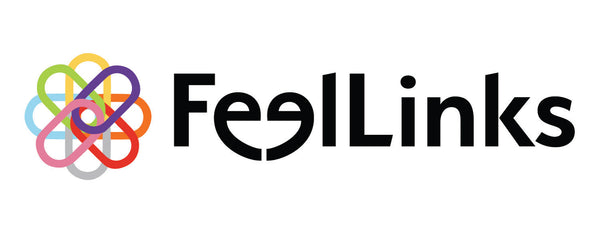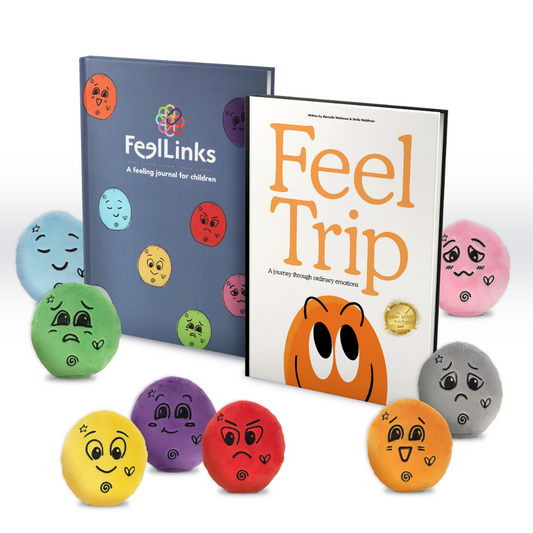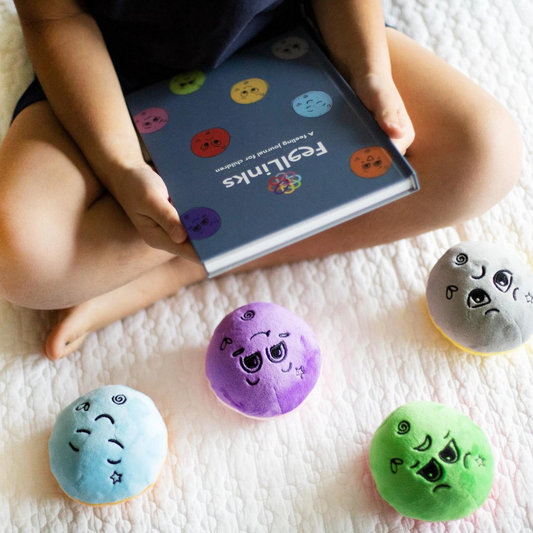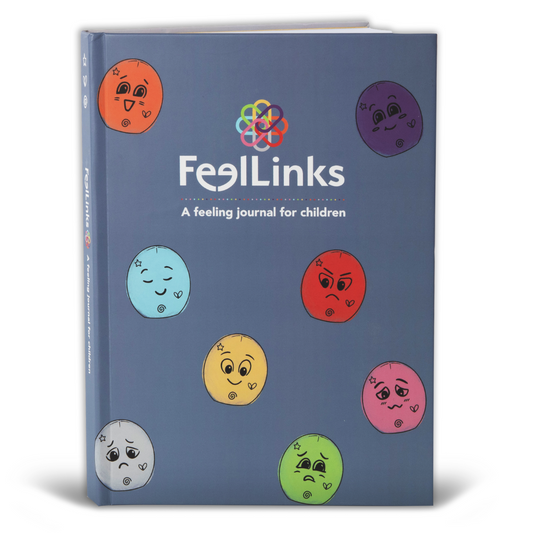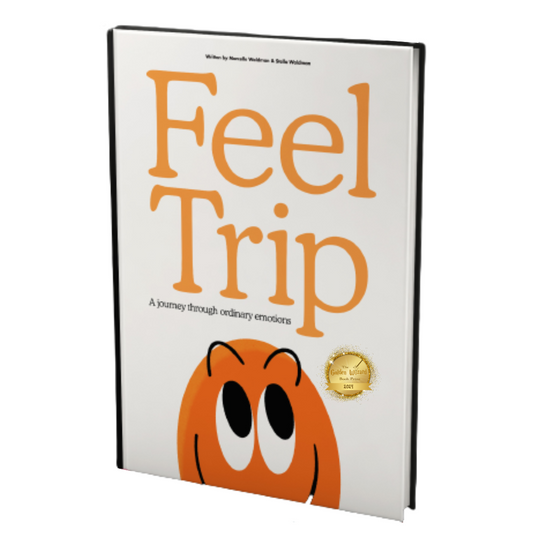Let Them + Let Me: A Guide To Reclaiming Your Power
Share

The first portion of this article is how The Let Them Theory applies to adults. The second portion of the article is how it applies to Parenting with Let Them.
*TV Interview! New Day Northwest from Monday, February 24th, Applying the Let Them Theory to Parenting*
It all started when I heard The Mel Robbins Podcast episode, "The One Tool to Transform Your Relationships: The Let Them Theory." The episode left me eager to learn more, leading me to discover The Oprah Podcast, where Mel Robbins spoke more about this idea of "How to Improve Your Life With One Change".
The Let Them Theory resonated with me, so I immediately pre-ordered the book. Once it (finally!) arrived I decided to read along while listening to Mel's incredible voice narrate it on Audible. It made me feel like she was speaking directly to me!
At its core, The Let Them Theory shifts our focus away from stressing over others’ actions - things we cannot control - and redirects it toward what we can control - ourselves.
We’ve all been there - stuck in traffic, facing travel delays, or waiting in an endlessly long checkout line. These situations are beyond our control, but how we respond to them is entirely up to us. Will you sit in traffic raging, or have a personal dance party in your car? Will you let a flight delay ruin your day, or use the time to finally listen to that podcast you’ve been meaning to catch up on?
"For too long, you’ve been working against this fundamental law of human nature - fighting to change people, battling to control situations, and worrying about what others say, think, or do. In doing so, you’ve created unnecessary stress, tension, and friction in your life and relationships."
It’s time to use The Let Them Theory and take back your power - choosing what’s best for your peace, health, and well-being.
Stop Wasting Energy on What You Can’t Control
One of the most liberating aspects of the Let Them Theory is that it frees you from the burden of managing other people. Without realizing it, many of us exhaust ourselves trying to fix, change, and manage the people around us. The truth is, the only thing we truly control is ourselves. This is a freeing concept that empowers you to take charge of yourself, set your boundaries, and take actions that you choose - bringing the focus to yourself.
Knowledge is Power: Understanding Stress
The first step in taking back control is understanding how stress impacts both our brain and body. When you feel stressed, your prefrontal cortex (the part of the brain responsible for thinking, decision-making, and language) essentially shuts down, while your amygdala (the part responsible for fight, flight, freeze, or fawn responses) takes over. This often leads to irrational decision-making and impulsive behaviors.
The good news? You can reset your brain. The Let Them Theory helps you tell yourself that other people’s actions are beyond your control - freeing you from all of that unnecessary stress. Don’t let your emotions become hijacked by someone else's actions and behaviors.
Here are 3 steps that you can apply:
- Let Them. Pause. This isn't worth stressing about. Detach from the stressful response.
- Let Me. Focus on yourself and what you can control. What will you say, think or do? What will be your words, thoughts, and actions?
- Breathe. Slow your stress response, calm yourself and regain your power. Deep breathing is scientifically proven to reset your nervous system.
What Can You Control? Your Response.
“When you let other people stress you out, you surrender your power to things that either don’t matter or are beyond your control. And it often spirals into other areas of your life for hours, weeks, and even years.”
Trying to manage things beyond your control will not change the other person. However, you can control how you respond to a situation. Instead of getting worked up over other people’s behavior, take action to keep yourself calm and composed. When your brain and body get out of survival mode (flight, fight, freeze, fawn), you free yourself from the unnecessary stress.
Protect Your Peace
We often give too much of our own power away to others by allowing their behavior to dictate our emotions. The key to a happier life is when you stop letting others distupt our peace. Getting caught up in others' actions only drains us and causes exhaustion - this is not great for our emotional, physical or mental health. Hold on to your energy, use it to move forward and achieve what you want to in this life. Don't be stuck in frustrations and stressors that you have no control over. You must protect your peace!
Making Decisions: Aligning With Your Values
“Make choices that make YOU feel proud, not ones that just appease someone else.”
If you’re constantly feeling burnout or you are in a chronic state of stress, it’s an important signal that something needs to change. Instead of staying angry or stuck in frustration, take ownership of what you can do to improve your situation.
Family & Relationships: A New Perspective
Family can be a source of stress because they are often the people closest to us and the most vocal about our lives. While their opinions may sometimes feel judgmental, they usually stem from love and a genuine desire for our wellbeing. Instead of letting their words create stress, you can choose to shift your perspective. By stepping into someone else’s "Frame of Reference", you can deepen your connections and strengthen our relationships. What you are doing here is creating greater acceptance, less friction and greater connection.
Agency: They Control Their Own Life
“You must let adults be adults. Let Them. Acceptance of another person as they are is the foundation of a healthy and loving relationship.”
When it comes to relationships - friendships, spouses, partners, or co-workers - it’s vital to recognize that you cannot control whether someone else changes. Adults change only when they choose to and put in the effort to do so. While you can model the behaviors you hope to see in others, true change must come from inside themselves.
In any adult relationship, at least one person must take the initiative to approach things differently. The good news is that you have the power to be that person.
Emotions: Recognizing and Managing Your Reactions
Emotions are chemical reactions happening in our bodies. You need to be able to acknowledge our emotions, communicate your needs, and regulate your responses. What you cannot do is control how someone else reacts to their own emotions.
You do not have the power to control someone else - not their words, nor their actions, nor their emotions.
The Power of Emotional Intelligence
Emotions are contagious. Someone else’s anger, frustration, or sadness can quickly shift the energy in a room or in a conversation. While you cannot manage their emotions, you can manage your own by making decisions that align with your core values.
When you say Let Them, you acknowledge that you do not have the power to control someone else - not their words, nor their actions, nor their emotions.
This realization stuck with me throughout reading and re-reading this book: For Let Them and Let Me to truly work, you need to possess emotional intelligence skills. Understanding your own emotions, recognizing how they affect you, how they affect others, and regulating them effectively is essential. This takes practice and becomes a powerful tool for protecting your peace and happiness in this life.
You Are In Your Let Me Era
"It's not about them at all is it? Because when you let them be them, you can finally let me be me!"
This is YOUR one wild, beautiful life - treat yourself with the love and respect you deserve.
✨ I DESERVE IT!
✨ LET ME LOVE MYSELF ENOUGH!
✨ “EVERYTHING YOU ARE LOOKING FOR STARTS WITH YOU!”
✨ “LET ME, BE ME”
"It's simple...but I didn't say it was easy"
Parents: What About The Let Them Theory With Children?
When it comes to children, parents are responsible for their children's emotional, financial, and physical support. You will find this portion of the article shining a bit of different light on how you can use The Let Them Theory as a parent.
The Let Them Theory Parenting Guide, by Mel Robbins and Dr. Stuart Ablon, provides a framework for parenting that encourages autonomy while maintaining safety, limits, guidance, and support.
When we approach parenting with acceptance, active listening, greater understanding and flexibility, we create a healthier relationship with our children.
"But it starts with us. Not our kids. Because even the best parenting approaches are only useful if we can think straight enough to use them!"
When To Let Them
✅ Encourages parents to release control in low-stakes situations to foster independence.
✅ Helps children develop autonomy, problem solving skills, and intrinsic motivation.
✅ When to Let Them: Low-stakes examples include: choosing their clothes, deciding when they are hungry, and choosing extracurricular activities.
✅ Offer your opinion and Let Them come up with solutions within reason.
When Not to Let Them
⚠️ Parents must step in when a child is in danger, engaging in self-destructive or irresponsible behavior.
⚠️ The goal is not to let children do whatever they want, but rather to find the balance of freedom of choice while maintaining safety, limits, guidance and support.
When To Use Let Me
🔹 We cannot Make Them – especially as they grow older. This approach will only cause more tensions. Additionally, making them does not support building the skills they need to be independent thinkers and manage future situations.
🔹 Instead of trying to Make Them behave a certain way, parents should shift to Let Me Work With Them (more on this below).
🔹 Let Me in parenting involves collaboration, open communication, and problem-solving rather than using force and/or punishment.
🔹 Parents, you need to manage your own emotions (emotional intelligence is a huge piece here) to avoid power struggles and teach kids healthy emotional regulation skills.
When To Work With Them
“If you Let Them and it doesn’t go well, you give them the opportunity to learn from their mistakes. But if they don’t learn from their mistakes or they keep repeating the same mistakes, they probably need your help building some skills to handle those situations better.”
✅ Parents, state the problem as the problem, stay away from words that make the child the problem
✅ Gather information: Use open ended questions to see if they can tell you what is going on.
✅ Actively listen to what they share. Then, Let Them know why you see this as a problem.
✅ Invite your child to come up with solutions to the problem. Letting them go first helps them feel invested. Whether it’s a good idea or not – validate it!
✅ Suggest your own way to solve the problem.
✅ Boom! You have just worked with them to problem solve, practice new skills and helped build your relationship and authority.
We All Do Well If We Can!
🧠 Children want to succeed! They need the right supports, skills, and understanding to navigate life’s ups and downs.
💙 Parents do well if they can! With the skills and tools we possess, we are doing our very best to effectively parent. The number one thing that we need to learn to do is regulate OUR emotions so that we can work together with our children instead of working against them.
By using The Let Them Theory for autonomy and The Let Me Work With Them for guidance, parents can create deeper connections, trust, and openness with their children while equipping them with lifelong skills.
"It's simple...but I didn't say it was easy"
So, parents, let’s …
✨ Let Them be who they are.
✨ Let Them have their feelings.
✨ Let Them have their own perspectives and ideas.
✨ Let Them have their autonomy.
✨ Let Them try and fail.
✨ Let Them make decisions and learn from them.
✨ Let Them take responsibility.
✨ Let Them practice coming up with solutions.
✨ Let Them hold themselves accountable.
Final Thoughts:
At the heart of the Let Them Theory is the need for emotional intelligence. To truly embrace this approach in your life, you must develop and strengthen key emotional intelligence skills:
- Self-awareness – Recognizing and understanding your own emotions.
- Social awareness – Recognizing and understanding how others feel, showing empathy and compassion.
- Self management – Regulating your emotions and responses effectively.
- Responsible decision making – Making thoughtful choices that align with your values.
- Relationship skills – Building and maintaining meaningful, healthy connections.
These foundational skills shape everything we do in life. That’s why FeelLinks has created tools to help children develop these abilities early - because emotional intelligence is a gift that keeps on giving.
Many of us didn’t grow up learning how to express emotions or communicate our needs effectively. But now that we know better, we have the responsibility to do better.
For the Let Them Theory to truly work- Let Them + Let Me + Let Me Work With You - it requires a strong foundation of emotional intelligence. When we cultivate these skills, we empower ourselves and those around us to live with greater peace, understanding, and connection.
**References: Quoted text in this article are stated/written by Mel Robbins from her book "The Let Them Theory". The Parenting With Let Them portion of this article quoted text is written by Mel Robbins and Dr. Stuart Ablon
